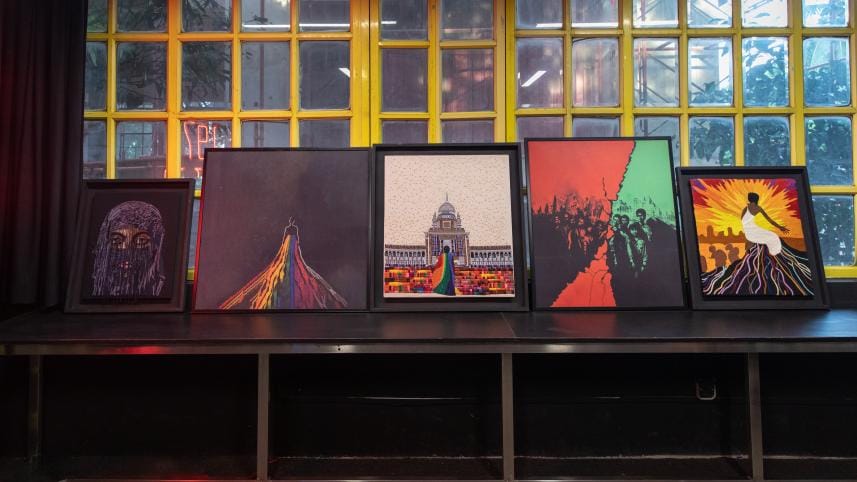“1972 Art 39”: How Mohammed Maaz is stitching social justice into fashion

The room was lively, and all around us, there were thread-bound canvases leaning against walls that served as portraits of defiance and fragments of untold stories. And at the centre of it sat Mohammed Maaz, a soft-spoken artist.
Before venturing into the world of art and design, he spent over two decades in the steel industry. In a candid conversation on a July afternoon, we spoke with the artist about art and design. However, his eyes lit up every time the conversation turned to freedom, justice, and resistance.
Maaz's work fills the emotional and political gaps left by both mainstream media and traditional NGOs. At a time when many avoid political expression for fear of repercussion, he invests in it. In a country where arts education is often undervalued and political neutrality is demanded, his venture is a small but potent act of cultural dissent.

The awakening
Mohammed Maaz does not carry the air of an artist-activist. He does not go for flamboyant declarations and certainly does not chase attention. But there's a quiet urgency in the way he speaks. Like someone who's learned to turn silence into something more powerful. And for him, the year 2023 was a turning point.
"I was depressed and the world felt heavy. Like we'd all forgotten what freedom meant," he explains. One day, in that haze of frustration and helplessness, he picked up the Constitution of Bangladesh.
"I found Article 39, which promised me freedom of speech, expression, and conscience. That's the day I realised that this isn't a gift from a government, but a birthright."

However, where does one go to exercise that right when public spaces are watched and voices are silenced?
Most people would not think of rebellion when they look at embroidery. However, Mohammed Maaz's jackets and textiles are stitched with symbols of defiance. His first work centred on the underrepresented communities, following conversations with individuals whose lives had been defined by rejection.
"Hearing their stories, I realised how invisible they were. That made me cry. That made me act," he says.
Working with artisans from the Bihari communities of Mohammadpur and Mirpur, he learned of embroidery as a medium and insisted it could be more than decoration. The artisans were sceptical at first.
"They told me the designs would fail, the cloth would be wasted," he recalls. Six months later, a design finally worked. And the result was astounding – a voice made visible.

Not your typical fashion brand
The label "1972 Art 39" emerged from a process. Named after the year the Constitution of the country was written, it is not about seasonal trends or celebrity endorsements (though, yes, one of Maaz's jackets worn by Adnan Al Rajeev made it to Cannes). It's about documenting the stories of people often left out of the national imagination.

His pieces have been displayed in exhibitions as far as New York, and during a major human rights event hosted by ActionAid, ambassadors and cultural figures were drawn to his work. The pieces tackled gender identity and the erasure of dissent. Each design was hand-embroidered by artisans who used to earn modest wages, and often juggled family obligations and social stigma.
"When they stitch, they're not just sewing patterns," Maaz says. "They're embedding their own survival stories. Embroidery was my choice because every thread, every weave, carries meaning. It's slow, just like our fight for justice."

Revolution and resonance
Throughout our conversation, Maaz returns to one idea: resistance doesn't need a loudspeaker. It needs courage. His activism isn't born from ideology, but from lived contradictions. For him, art was not only aesthetics, but also a survival tool.
"My work has not been much liked by the family. Still, I listened to my heart and continued. I'm not a speaker, but I can express myself with fabric. That's my protest," he affirms.
When the July Movement took over Dhaka in 2024, he was watching, listening, and eventually participating — online and off. He collaborated with young rap artists to produce a protest album, Sangram, amplifying youth voices that had no recording budget, but had plenty to say.
Entrepreneurship in Bangladesh often focuses on solving market problems: transport, logistics, fintech, etc. But what Maaz offers is a different kind of solution: cultural and civic disruption through storytelling.

"We're not taught to love ourselves in this country," he says. "We're taught to obey and no one teaches kindness. No one teaches how to respect someone different from you."
This is why entrepreneurs like Maaz matter. Not because they scale fast or rake in millions, but because they remind us what freedom of conscience looks like up close. He is sceptical of overused titles and tired of surface-level engagement, and he certainly does not call himself an activist or a disruptor.
"In Bangladesh, we say we care about art and justice, but we rarely mean it. There's no real infrastructure for it. No respect for our artists," he states.
Still, he hopes. Hopes that 1972 Art 39 can grow into a global platform. That his embroidered stories will one day travel to places where their messages might land louder, unfiltered by local censorship or fear.

Already, some of his pieces are in New York.
Socially conscious entrepreneurship is not just a trend, but indeed a necessity. In countries like Bangladesh, where structural oppression still silences millions, people like Maaz are filling a dangerous vacuum. They may not always be celebrated. They may face backlash, censorship, or even ridicule. But they are building alternative futures, thread by thread.
And the fact that Maaz doesn't want to be glorified? That may be his most radical act yet.



 For all latest news, follow The Daily Star's Google News channel.
For all latest news, follow The Daily Star's Google News channel.
Comments